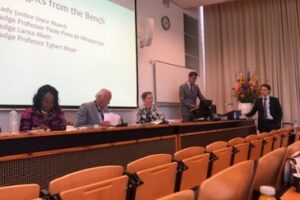Judges on politically sensitive descisions
How do judges themselves feel about the political sensitivity of their decisions?
On Friday 8 and Saturday 9 July, the conference 'Courts as an Arena for Societal Change', organised by the Institutions for Conflict Resolution (COI) research group, took place at Leiden University’s Faculty of Law. This is the last blog in a series about the conference that was published in the lead-up to the conference days.
It can rightly be said that our faculty was buzzing during the two days on which the conference took place. The diversity of the participants, combined with the beautiful weather, made for a cheerful and relaxed atmosphere. However, despite the wide variety of nationalities, disciplines and areas of law represented by the participants, the theme of the conference was remarkably focused. No matter which panel you entered, similar questions were discussed, for example: What is the role of the judiciary in cases that are the subject of fierce political and social contradictions? What motivates parties to submit these cases to the courts? And what are the implications for the legitimacy of the judge if his rulings are perceived as political, that is, biased and not neutral? Passionate pleas were made for greater judicial involvement in issues such as climate change, war crimes and minority rights. But one could also hear warnings against increasing contradictions if the judges do not clearly delineate the legal conflicts on which they rule.
That is why it was a good choice to present these dilemmas to a panel of judges at the end of the conference. Four well-respected judges took part in this: Joyce Aluoch (International Criminal Court, Court of Appeal and High Court of Kenya), Paulo Pinto de Albuquerque (European Court of Human Rights), Larisa Alwin (Amsterdam Court of Appeal), and Egbert Myjer (European Court of Human Rights). The panel was prepared thoroughly by scouts who reported on the parallel sessions to discussion leaders Bastiaan Rijpkema and Margaretha Wewerinke-Singh. The discussion leaders, in turn, managed to put the questions to the judges in an eloquent and knowledgeable way. The discussion was passionate and at times hilarious. Judge Myjer, for example, explained that even the question of whether cows could go on a holiday became political when asked in light of the limited milk quota.

Two positions stood out because of the unanimity with which they were propagated. First, the judges opposed the qualification that they would make political decisions. They maintained that court decisions are never political: they are always an interpretation of the applicable law. Interpreting legislation is one of the core tasks of judges and therefore has nothing to do with politics, according to the judges. The panel therefore preferred not to use these or similar qualifications. Second, the panel members unanimously reacted in an agitated way to the systematic lack of implementation of European Court of Human Rights judgments by, for example, Russia and Turkey. ‘That's wrong’, Judge De Albuquerque exclaimed, whose online participation did not in the least lessen his passion.
Unfortunately, the strong views of the judges about how things should be do not always correspond to empirical reality. Court decisions are perceived as political, sometimes the legitimacy of the judges is deliberately undermined and judicial decisions are not always obeyed. How to protect the judiciary against these forces is a question of great importance, especially at a time when increasing fragmentation means that we can rely less and less on politics as a resolver of social conflict. We therefore hope that the lively discussions that took place during the conference will also continue within the many judiciaries that were the subject of discussion. It is one of the important COI research themes, and we will continue to share our findings in this regard with the courts in the future.



0 Comments
Add a comment